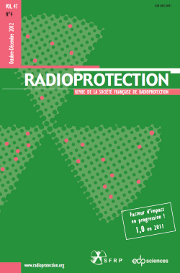Crossref Citations
This article has been cited by the following publications. This list is generated based on data provided by
Crossref.
Pröhl, G.
Ehlken, S.
Fiedler, I.
Kirchner, G.
Klemt, E.
and
Zibold, G.
2006.
Ecological half-lives of 90Sr and 137Cs in terrestrial and aquatic ecosystems.
Journal of Environmental Radioactivity,
Vol. 91,
Issue. 1-2,
p.
41.
Strebl, F.
and
Tataruch, F.
2007.
Time trends (1986–2003) of radiocesium transfer to roe deer and wild boar in two Austrian forest regions.
Journal of Environmental Radioactivity,
Vol. 98,
Issue. 1-2,
p.
137.
Vinichuk, M.
Rosén, K.
and
Dahlberg, A.
2013.
137Cs in fungal sporocarps in relation to vegetation in a bog, pine swamp and forest along a transect.
Chemosphere,
Vol. 90,
Issue. 2,
p.
713.
Rulík, Petr
Pilátová, Helena
Suchara, Ivan
and
Sucharová, Julie
2014.
Long-term behaviour of 137Cs in spruce bark in coniferous forests in the Czech Republic.
Environmental Pollution,
Vol. 184,
Issue. ,
p.
511.
Škrkal, Jan
Rulík, Petr
Fantínová, Karin
Mihalík, Ján
and
Timková, Jana
2015.
Radiocaesium levels in game in the Czech Republic.
Journal of Environmental Radioactivity,
Vol. 139,
Issue. ,
p.
18.
Merz, Stefan
Shozugawa, Katsumi
and
Steinhauser, Georg
2016.
Effective and ecological half-lives of 90Sr and 137Cs observed in wheat and rice in Japan.
Journal of Radioanalytical and Nuclear Chemistry,
Vol. 307,
Issue. 3,
p.
1807.
Khomutinin, Yu.V.
and
Kashparov, V.O.
2016.
Optimization of fish sampling procedure for evaluating the specific activity of 137-Cs, 90-Sr and accumulation coefficients.
Nuclear Physics and Atomic Energy,
Vol. 17,
Issue. 2,
p.
189.
Steinhauser, Georg
and
Saey, Paul R. J.
2016.
137Cs in the meat of wild boars: a comparison of the impacts of Chernobyl and Fukushima.
Journal of Radioanalytical and Nuclear Chemistry,
Vol. 307,
Issue. 3,
p.
1801.
Wada, Toshihiro
Tomiya, Atsushi
Enomoto, Masahiro
Sato, Toshiyuki
Morishita, Daigo
Izumi, Shigehiko
Niizeki, Kouji
Suzuki, Shunji
Morita, Takami
and
Kawata, Gyo
2016.
Radiological impact of the nuclear power plant accident on freshwater fish in Fukushima: An overview of monitoring results.
Journal of Environmental Radioactivity,
Vol. 151,
Issue. ,
p.
144.
Wakiyama, Yoshifumi
Konoplev, Alexei
Wada, Toshihiro
Takase, Tsugiko
Byrnes, Ian
Carradine, Matthew
and
Nanba, Kenji
2017.
Behavior of 137Cs in ponds in the vicinity of the Fukushima Dai-ichi nuclear power plant.
Journal of Environmental Radioactivity,
Vol. 178-179,
Issue. ,
p.
367.
Zhao, Xudong
Meng, Qinghui
Chen, Geng
Wu, Zhihao
Sun, Guangai
Yu, Guobing
Sheng, Liusi
Weng, Hanqin
and
Lin, Mingzhang
2018.
An acid-resistant magnetic Nb-substituted crystalline silicotitanate for selective separation of strontium and/or cesium ions from aqueous solution.
Chemical Engineering Journal,
Vol. 352,
Issue. ,
p.
133.
Chiaravalle, A. Eugenio
Mangiacotti, Michele
Marchesani, Giuliana
Bortone, Nicola
Tomaiuolo, Michele
and
Trotta, Gabriele
2018.
A ten-year survey of radiocontamination of edible Balkan mushrooms: Cs-137 activity levels and assessed dose to the population.
Food Control,
Vol. 94,
Issue. ,
p.
263.
Zarubina, Nataliia E.
Semak, Vladislav
Burdo, Oleg S.
and
Ponomarenko, Liliia P.
2022.
Ecological Half-Life of 137Cs in Fungi.
Ecologies,
Vol. 4,
Issue. 1,
p.
11.
Berendes, Ole
and
Steinhauser, Georg
2022.
Exemplifying the “wild boar paradox”: dynamics of cesium-137 contaminations in wild boars in Germany and Japan.
Journal of Radioanalytical and Nuclear Chemistry,
Vol. 331,
Issue. 12,
p.
5003.
Oloś, Grzegorz
and
Dołhańczuk-Śródka, Agnieszka
2022.
Effective and environmental half-lives of radiocesium in game from Poland.
Journal of Environmental Radioactivity,
Vol. 248,
Issue. ,
p.
106870.
Zarubina, Nataliia
Semak, Vladislav
Burdo, Oleg S.
and
Ponomarenko, Liliia P.
2023.
Ecological Half-Life of 137Cs in Fish.
Ecologies,
Vol. 4,
Issue. 3,
p.
463.
Qiao, Jixin
Andersson, Kasper
and
Nielsen, Sven
2024.
Half-century trends of radioactivity in fish from Danish areas of the North Sea, Kattegat, and Baltic Sea.
Environmental Pollution,
Vol. 346,
Issue. ,
p.
123681.
 ). In fresh water systems we fitted lognormal distributions of T$_{\scriptsize\textrm{eco}}$
). In fresh water systems we fitted lognormal distributions of T$_{\scriptsize\textrm{eco}}$ for 137Cs (e.g. in the water of 32 European lakes, T$_{\scriptsize\textrm{eco}1}$
for 137Cs (e.g. in the water of 32 European lakes, T$_{\scriptsize\textrm{eco}1}$ = (0.3*2.2$^{\pm 1}$
= (0.3*2.2$^{\pm 1}$ ) years and T$_{\scriptsize\textrm{eco}2}$
) years and T$_{\scriptsize\textrm{eco}2}$ = (5.7*3.9$^{\pm 1}$
= (5.7*3.9$^{\pm 1}$ ) years as geometric mean value and standard deviation). Pronounced seasonal variations were observed in suspended matter of Lake Lugano, reflecting the bio-mass cycle of this lake. In forests, ecological half-times for 137Cs can also be fitted by a lognormal distribution. For Central Europe T$_{\scriptsize\textrm{eco}}\:<$
) years as geometric mean value and standard deviation). Pronounced seasonal variations were observed in suspended matter of Lake Lugano, reflecting the bio-mass cycle of this lake. In forests, ecological half-times for 137Cs can also be fitted by a lognormal distribution. For Central Europe T$_{\scriptsize\textrm{eco}}\:<$ 12 years. Extraordinarily high 137Cs activity concentrations were observed recently in wild boar in Germany. For Eastern Europe the physical half-time is dominant and in some components of the ecosystem the activity concentration is still increasing.
12 years. Extraordinarily high 137Cs activity concentrations were observed recently in wild boar in Germany. For Eastern Europe the physical half-time is dominant and in some components of the ecosystem the activity concentration is still increasing.


